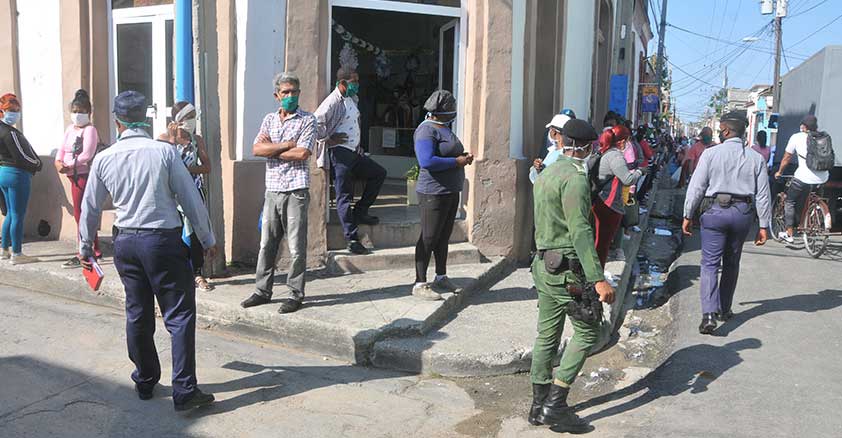
Strengthening the actions of the plan to confront the new coronavirus, raising the requirement to enforce them and, above all, not reducing the perception of risk are today cardinal points in the phase of limited indigenous transmission that the country's leadership decreed, confirming new cases in some localities without managing to establish their links with travelers from affected areas.
Las Tunas, Cuba.- In response to such scenario, the Provincial Defense Council (CDP) adopted other measures and pointed out the details that could, from one moment to the next, transform the stable epidemiological panorama in the territory, as the president of this body, Manuel Pérez Gallego reiterated: "in this battle, it is better to sin by excess and not by default."
So far, there are three positive cases for COVID-19 reported in previous days. To the satisfaction of the people from Las Tunas, the first confirmed patient, Iliana Pérez, from the community of Guayacán, “Jesús Menéndez”, and also her husband, an Italian citizen whoever was the source of the contagion, have already been discharged. Now, they remain under surveillance at their home by the Primary Health Care and after that period they will repeat the PCR in real-time after a definitive discharge.
More than 1,580 rapid diagnostic tests have been applied to those suspected of the disease, their contacts, and people with severe acute respiratory infections; as well as more than 390 real-time PCR samples. And although concern and shock at false positives have swept the streets here, they have ultimately turned negative after confirmation tests. However, these events and the behavior of the disease in the nation make it clear that cannot let our guard down for a second.
Even so, the concentrations in the queues, bus stops and the indisciplines in the neighborhoods are still problems without effective solutions. It seems that some are oblivious to the current situation of the Island and do not internalize what would represent that such a lethal pandemic reaches this province with an aging population and marked by dissimilar chronic non-communicable diseases.
Dr. Viviana Gutiérrez, head of the Health Subgroup in the Economic Social Group, pointed out that there are a significant number of travelers who came from other provinces. "We have to do intensive work in each of the defense councils and medical offices to identify them, especially those from places with a more complicated scenario to detect possible cases in a timely manner."
She said that there are still risks associated mainly with the contacts of compatriots living or traveling to other countries that were under surveillance by the health area. She also mentioned among the vulnerabilities that there are residents who continue to deny respiratory symptoms, making the work of health personnel more difficult.
NOT TO LEAVE LOOSE CAPS
In the current context, Jaime Chiang Vega, vice president of the CDP, indicated that they evaluate the closure of non-essential activities that are not linked to the production of food and hygiene, construction materials, medicines, oil refining and import substitution, among other fields.
To continue with the reduction of personnel, he oriented the rigorous analysis in each entity. “Among the activities that will remain, we must also determine who will continue working. This decision is adopted so that people are at home,” he said.
He reported that means of transport like minibusses, buses and others will be available to the Integrated System of Medical Emergencies (SIUM). The decision to suspend inter-municipal transportation will allow answering the call in certain medical situations and is aimed at avoiding the transfer of people with the consequent epidemiological risk. Likewise, the work of urban transport inspectors and the services of horse-drawn cars, motorcycles and pedicabs stops.
In addition, the sale of alcoholic beverages in restaurants, cafes and bars is suspended; Ideal markets are closed and they organize the distribution of products to the regular store network by popular councils and with access through the ration card.
The markets El Tunero and El Mambí suppress the sale of pork and the distribution of these assortments to the processing centers available to the communities was indicated. In such establishments, said Chiang Vega, they will make croquettes, hamburgers, sweets, sausages and pickles.
Restaurants and other units will be open until 8:00 at night, increasing takeaway offers. On the other hand, the 24-hour services are reduced to 12, and the entities that offer similar services in the same artery are reordered.
Likewise, in the province, they work to increase the sale of chlorine, with emphasis on the main municipality. So far 99 points operate where the people can acquire this substance, vital in the disinfection of hands and the cleaning of surfaces.
As for high-demand products, such as chicken, oil, detergent and toiletries, the Vice President of the Defense Council declared that they are analyzing the alternatives and will present proposals for the organization of the sale by nuclei in the network of Commerce and Cimex. The sale of agricultural products will also be carried out by the ration card, when the potato sale ends, with the aim of achieving an equitable distribution.
On the other hand, the decision was made to postpone the collection of electricity, water and gas services, except for those that can be carried out electronically with the use of Transfermovil. They also indicated the reduction of the liquefied gas cycle distribution to 30 days.
The authorities highlighted the response of various entities and workers who support health personnel in the isolation centers, and praised the work of Acinox workers, who manufactured more than a hundred beds for hospital care.
Manuel Pérez Gallego said that in this scenario, work in defense areas is essential, where the active inquiries in search of respiratory infections must be increased in number and quality.
He said that these are moments of sensitivity and of adapting each situation to the specific contexts of places, families and people, so that no person from Las Tunas feels unprotected or poorly cared for, in times when solidarity and unity must prevail.




